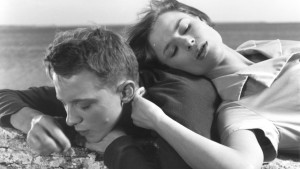 Review: One Screening Only
Review: One Screening Only
Through a Glass Darkly | Ingmar Bergman | Sweden | 1961 | 91 minutes
UW Cinematheque, Chazen Museum of Art, Sunday, February 28, 2:00pm»
Through a Glass Darkly is very similar to other Bergman films, with a cast made up of many of the same actors featured in his other films, like Harriet Anderson, Gunnar Bjornstrand, and Max von Sydow. Like his other films, there is a lot of ambiguity in how people feel, why they say what they do and the meaning of their actions. And in the typical Bergman fashion, everyone is deeply disturbed and struggling with some kind of inner demons. These familiar elements make the film enjoyable for Bergman fans. But the simplicity of Through a Glass Darkly leaves more for the audience’s imagination, making it much more intriguing to watch.
In the opening scene the characters are arguably happy. They are coming in from a swim, laughing and joking around: Karin (Harriet Andersson) and her brother Minus (Lars Passgard), their Papa (Gunnar Björnstrand) and Karin’s husband Martin (Max von Sydow). But once they are separated, with the two siblings going to get milk and the two older men bringing in the nets, it becomes painfully obvious that everyone is miserable. This shift in tone is very sudden.
We find out from the conversation between Papa and Martin Papa that Karin is an incurable schizophrenic. She seems fine, even to Martin, her lover, but she isn’t.
From the sibling’s conversation we find out the Papa is gone a lot, and that he is very distant from them, especially Minus. We also find out that Minus has a problem with Karin sunbathing and kissing him so much. Feelings bordering on incest, huh? Ok, noted.
But then they all come back together for dinner, and again they are so happy and welcoming Papa home. Now, though, their happiness seems fake and forced. Their charade is painful to watch. We assume it is only a matter of time before things fall apart again.
The story spans over two days and in that time we learn that the family is dysfunctional and that Karin is really sick. She talks to herself in a room one morning, acting as if she sees people that the audience can’t see. Papa struggles with his own sins, crying sometimes when he is alone. Minus tries to be upbeat, but is upset that his father doesn’t talk to him. And Martin hates that he is in love with a woman with an incurable disease.
The biggest difference from other Bergman films is that Through a Glass Darkly is more simply told. Unlike Persona or The Passion of Anna there isn’t much experimentation with narration or the cinematography. The story takes place within a fairly limited time and confined space focusing on the four characters, unlike even Summer with Monika. The minimized plot of Through a Glass Darkly let me do the interpretation and connect the dots. I felt less like I was being spoon fed the deeper meanings, and instead could take from the film what I wanted and connect to the character’s emotions as I understood them. Of course, I haven’t seen all Bergman films so this is based on my limited viewing experience.
If you take the basic plot, strip it of latent themes, the story is simply about a girl who is sick and her family is concerned. It seems she is getting better, but then BAM! She gets worse. Of course there is more to the film. There are layers, but these layers aren’t highlighted or explored fully, leaving the basic plot in the spotlight.
The best part of this film for me was Harriet Andersson. I love Harriet Andersson. I loved her in Summer with Monika. She is so magnetic, and so convincing. She is gorgeous too, but that doesn’t take away or distract from her incredibly passionate performance. The cinematography is also right in line with other Bergman films, black and white, shadows, close-ups. And the setting is bare, likely to give more attention to the emotion-filled actors.
Through a Glass Darkly is filled with distressed characters, and like a lot of Bergman films this aspect makes the film hard to watch at times. Afterwards I felt like I went through an emotional crisis myself. These films can also be frustrating for me because I am constantly wanting more information that what I am given. But I really liked the simplicity of the plot, and how the plot advanced mostly through dialogue between the small number of characters. To me, this demonstrates Bergman’s talents since he can tell an effective, emotional story so efficiently.